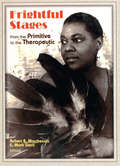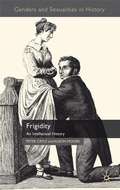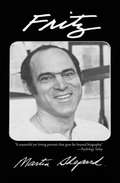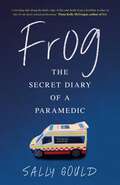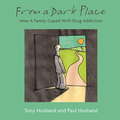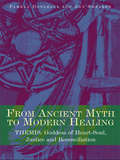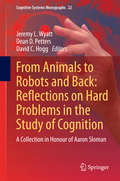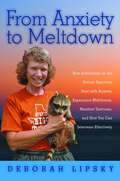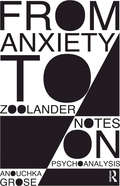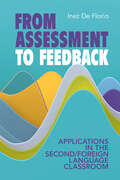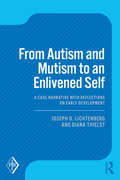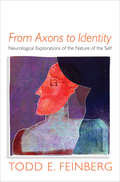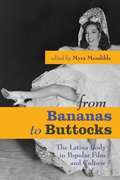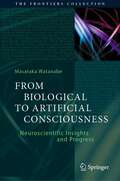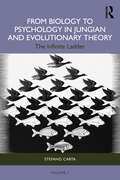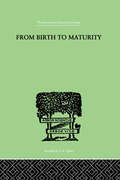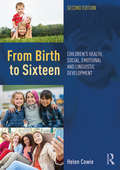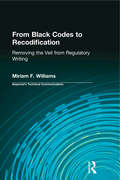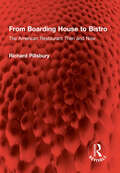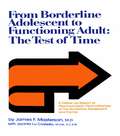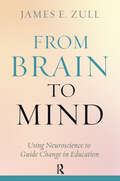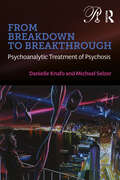- Table View
- List View
Frightful Stages: From the Primitive to the Therapeutic
by Robert B. Marchesani E. Mark SternFace stage fright and self-doubt with new courage!The experience of awe has rarely been considered by psychologists, but this extraordinary book makes up for that neglect. Frightful Stages explores all the shades of that strange emotion from reverence to terror. At its heart, awe is the condition of human suffering in situations that require you to act in all the senses of that deceptively simple word, whether on stage or off, whether in the presence of many or alone.Frightful Stages provides a multifaceted view of the semiotics of awe. It deals with its manifestations in film, on stage, in poetry, in ordinary lives as well as in the more extraordinary ones, including Bessie Smith, Carl Van Vechten, Barbra Streisand, Federico Fellini, Thomas Merton, and John Ashbery. This unprecedented book delineates the experience of awe in moments of stage fright, performance anxiety, and everyday interpersonal relations. Frightful Stages takes place on and off stage, before the curtain and behind, in the audience and on the screen. It explores the mysterious experience of awe in a multitude of contexts, including: Thomas Merton's psychoanalytic showdown with Gregory Zilboorg the chronic tensions between Apollonian reason and Dionysian instinct in myth, psychoanalysis, creation, and performance the ill-fated encounter between the greatest of all blues singers and a brilliant, self-loathing literary critic the moment of awe in experiential psychotherapy as seen by both the analyst and client the differences and similarities between stage fright and social phobia the intricate interrelationships between pernicious envy, emotional awkwardness, and fear a personal diary chronicling one man's crisis of panic, anguish, and self-doubt the complexities of feeling, offering, and accepting reverence in the psychotherapeutic relationshipFrightful Stages gives clinicians and lay readers a variety of approaches from the analytic to the unanalytic, from the psychodynamic to the humanistic. It will appeal to a diverse audience, including therapists, clients, social theorists, cultural anthropologists, performers, and writers. Additionally, this book is intended to help artists deal with creative blocks, therapists cope with their own terrors, and all helping professionals understand bizarre phenomena.
Frigidity
by Alison Moore Peter CryleThis first major study of a curiously neglected term in the history of sexuality will intrigue students, scholars and enthusiasts alike. The authors take us through a journey across four centuries, showing how notions of sexual coldness and frigidity have been thought about by legal, medical, psychiatric, psychoanalytic and literary writers.
Fritz
by Martin ShepardFritz Perls described himself as a &“mediocre psychoanalyst&” who became &“the possible creator of a &‘new&’ method of treatment&”—Gestalt Therapy. His wife described him as half prophet, half bum. Dave Rybeck, reviewing FRITZ in Psychology Today, said that &“Martin Shepard has done an excellent job of getting into, on top of, and under the Fritz Perls mystique. He spent two years learning all he could about Perls&’s life and has produced a masterful yet loving portrait that goes far beyond biography. FRITZ offers a Fritz Perls to whom few, if any, were privy. This holistic view of Fritz, his early falterings, his neurotic rootlessness, his prima donna pettiness, his chronic self-doubts and, above all, his driving destiny to become a great master in the world of psychotherapy, reveals a human, lovable person. It leaves me feeling glad that Fritz did his thing. And that Martin Shepard did his, too.&”
Frog: The secret diary of a paramedic
by Sally Gould'A riveting ride along the knife edge of life and death from a frontline worker in one of our most crucial professions.' Fiona Kelly McGregor, author of Iris 'Frog', a term of endearment for intensive care paramedics, derives from the notion that everything they touch croaks. Sally Gould delivers a gripping and heartfelt memoir that dives into the unpredictable, often absurd, and sometimes heartbreaking reality of life as a paramedic. Life as a paramedic, writes Sally Gould in this candid, witty memoir, can be traumatic, gross, dull, hilarious, magical. To make the cut, you need to be able to think outside the square, keep calm in the midst of chaos, be in possession of a strong stomach, and simply brush it off when patients die. That&’s on top of having a profound understanding of the human body, plus the skills to counter its failings. It also helps to have a highly developed and oftentimes dark sense of humour. But behind the sirens and the life-or-death scenes, and the absurdity of non-urgent callouts, a paramedic&’s career is very different to how most people imagine it. Based on years of meticulously kept journals, Frog is an intimate look at the human cost of the job and the cumulative effect of trauma. Sally shares a personal story that is searingly honest and truly inspiring, one which offers a heartfelt tribute to the resilience, courage and camaraderie that define the high-stakes world of emergency medicine.
Frogs into Princes: Neuro Linguistic Programming
by Richard Bandler John Grinder John O. StevensIn one sense nothing that NLP can accomplish is new. There have always been "spontaneous remissions," "miracle cures," and other sudden and puzzling changes in people's behavior, and there have always been people who somehow learned to use their abilities in exceptional ways. What is new in NLP is the ability to systematically analyze those exceptional people and experiences in such a way that they can become widely available to others.
From A Dark Place: How A Family Coped With Drug Addiction
by Paul Husband Tony HusbandWhen the Husband family realised that their son Paul was addicted to heroin, they did everything they could to help him but it seemed that every step in the right direction would be followed by another relapse as Paul lied to them, stole from them, and come close to losing his life.This illustrated title from award-winning cartoonist Tony Husband tells the tale of those dark days as they worked as a family to get Paul into the right sort of supportive environment where he could truly recover from his dangerous addiction, and move from that dark place to a brighter future.This inspiring and compelling story will appeal to anyone who has struggled with an addictive disorder, or any families or friends who have had to support someone through such a situation. Anyone who was touched by Tony's Take Care, Son - The Story of my Dad and His Dementia will be similarly moved and uplifted by From A Dark Place.
From A Dark Place: How A Family Coped With Drug Addiction
by Paul Husband Tony HusbandWhen the Husband family realised that their son Paul was addicted to heroin, they did everything they could to help him but it seemed that every step in the right direction would be followed by another relapse as Paul lied to them, stole from them, and come close to losing his life.This illustrated title from award-winning cartoonist Tony Husband tells the tale of those dark days as they worked as a family to get Paul into the right sort of supportive environment where he could truly recover from his dangerous addiction, and move from that dark place to a brighter future.This inspiring and compelling story will appeal to anyone who has struggled with an addictive disorder, or any families or friends who have had to support someone through such a situation. Anyone who was touched by Tony's Take Care, Son - The Story of my Dad and His Dementia will be similarly moved and uplifted by From A Dark Place.
From Ancient Myth to Modern Healing: Themis: Goddess of Heart-Soul, Justice and Reconciliation
by Ann Shearer Pamela DonleavyThis book is about the energy personified by the classical Greek goddess Themis, who brought her divine and natural 'right order' to gods and humans, and who still presides over law courts as the figure of Justice. In many Western countries today, the growing dis-ease in minds and bodies of individuals is often echoed in whole communities. Rather than coming together, they seem to split apart in anger and distress. But themis energy is equally powerful, and can work to bring together and to heal. From the battle of the Titans and Olympians to the oracle at Delphi and the banquet of the gods, the stories of the goddess weave through these chapters to illuminate how themis energy is at work today. The authors explore psychological healing in individuals and relate this to new research in neurocardiology on the subtle interactions of body and mind. They show how the international movement for restorative justice is drawing on the same healing tools to benefit victims and offenders alike. And they evoke the extraordinary story of the South African Truth and Reconciliation Commission, which shows the world how themis energy can help transform a ravaged society. This book deepens understanding of the psychological urge towards healing and wholeness which is as much a part of human beings as the urge to destroy. It offers exciting new insights into Jung's unique approach to the relationship between individual and collective psychology. It will appeal to psychologists who work with individuals and groups, to lawyers and others concerned with the failure of current criminal justice systems, and to people involved in religious, political and other groups that seek to build communities which can encompass and even celebrate diversity rather than rejecting it in fear.
From Animals to Robots and Back: Reflections on Hard Problems in the Study of Cognition
by Jeremy L. Wyatt Dean D. Petters David C. HoggCognitive Science is a discipline that brings together research in natural and artificial systems and this is clearly reflected in the diverse contributions to From Animals to Robots and Back. In tribute to Aaron Sloman and his pioneering work in Cognitive Science and Artificial Intelligence, the editors have collected a unique collection of cross-disciplinary papers that include work on: · intelligent robotics; · philosophy of cognitive science; · emotional research · computational vision; · comparative psychology; and · human-computer interaction. Key themes such as the importance of taking an architectural view in approaching cognition, run through the text. Drawing on the expertize of leading international researchers, contemporary debates in the study of natural and artificial cognition are addressed from complementary and contrasting perspectives with key issues being outlined at various levels of abstraction. From Animals to Robots and Back, will give readers with backgrounds in the study of both natural and artificial cognition an important window on the state of the art in cognitive systems research.
From Anxiety to Meltdown
by Deborah LipskyAnxiety is the root cause of many of the difficulties experienced by people on the autism spectrum, and is often caused by things such as a change in routine, or sensory overload. Deborah Lipsky takes a practical look at what happens when things spiral out of control, exploring what leads to meltdowns and and tantrums, and what can be done to help. Drawing on her own extensive personal experience and using real-life examples to explain how autistic people think, the author distinguishes between meltdowns and tantrums, showing how they are different, how each can begin, and most importantly, how to identify triggers and prevent outbursts from happening in the first place. Practical and simple solutions to avoiding anxiety are offered throughout, and these are accompanied by calming techniques and suggestions for dealing with tantrums when they occur. This book will be an essential read for those on the autism spectrum, their families and friends, professionals working with them, and anybody else with an interest in autism spectrum conditions.
From Anxiety to Zoolander: Notes on Psychoanalysis
by Anouchka GroseFrom Anxiety to Zoolander is a collection of writings on psychoanalytic themes. Each text was originally delivered as a talk, and the book aims to retain the informality and directness of the spoken word. While many of the chapters focus on clinical questions, they also speak about art, comedy, fashion, fame and fiction. Freudian and Lacanian theories are central, but the book as a whole is far from doctrinaire, with all areas of psychoanalytic thinking being up for discussion. Clinical topics include acting out, narcissism, gender, transference, diagnosis, and the Oedipus complex, tracing ideas through Freud and the post-Freudians, and examining their relevance to the contemporary psychoanalytic clinic. Non-clinical topics include Louise Bourgeois's notes on her analysis, stand-up comedy, Paris Hilton's televised friendship auditions, and Ben Stiller's penetrating stupidity in Zoolander 2. While each essay is self-contained, the book argues overall for the continued relevance of Freudian ideas in the treatment of psychic suffering, as well as in the interpretation of cultural phenomena.
From Assessment to Feedback: Applications in the Second/Foreign Language Classroom
by Inez De FlorioFrom Assessment to Feedback addresses the need for practical and enriching literature on assessment and feedback in language teaching and learning. De Florio documents research-based forms of assessment and feedback in a succinct and accessible way, as the basis for classroom-oriented procedures in foreign/second language teaching. The multiple TEFL Examples lend themselves to direct use in language classrooms but can be easily adapted to other subject matters too. This book is divided into three parts – prerequisites, formative feedback, and summative feedback – promoting clear understanding. Each chapter ends with a 'Review, Reflect, Practice' section to summarise the chapter's content and facilitate the concrete application of these practice-oriented suggestions. Language teachers, other educational professionals, and teacher education students will benefit from this evidence-based research.
From Autism and Mutism to an Enlivened Self: A Case Narrative with Reflections on Early Development (Psychoanalytic Inquiry Book Series)
by Joseph D. Lichtenberg Diana ThielstFrom Autism and Mutism to an Enlivened Self explores the importance of intimacy, interaction with the environment and the mind-body connection in early childhood development, with specific reference to autism. Built around a detailed case study of a severely autistic child, the book offers an illuminating account of the development and successful treatment of autism both from the perspective of the clinician and from the family. In Part I, Diana Thielst (writing under a pseudonym) gives a description of her experience with her daughter who was autistic at birth, minimally verbal at age five, and did not respond to her name. She details the severe family stress and her ineffectual attempts to get professional help. Finally, she hears of consultants who may be able to help in St. Petersburg, Russia. Guided by the consultants, Thielst and her daughter then embark on a uniquely innovative method for Anna to both build a vocabulary and for the first time learn the value of coordinated and cooperative effort. Armed with a vocabulary and a long history of solo pursuits of organizing inanimate objects, Anna suddenly begins to explore "human" interaction as revealed in comics– a turning on to an emotional life of relatedness and intimacy. In Part II, Joseph D. Lichtenberg uses his knowledge of neonate and early infancy to offer the reader an understanding of autism – its history – and a unique comparison of the normal well adapted neonate and infant at one year with the disrupted development of the child with autism. Lichtenberg’s theoretical construct of three major pathways to a healthy adapted development breaks new theoretical ground and gives enrichment to a contemporary portrayal of the autistic experience. With unusually rich clinical material grounded in accessible theory, the authors jointly offer a new perspective on understanding, treating and living with autism. From Autism and Mutism to an Enlivened Self will appeal to psychoanalysts, psychoanalytic psychotherapists and clinicians working with autistic children.
From Axons to Identity: Neurological Explorations of the Nature of the Self (Norton Series on Interpersonal Neurobiology)
by Todd E. FeinbergA leading neuroscientist offers an intriguing scientific journey to understanding the neurobiology of the self. What can dementia, delusions, and other neurological disorders teach us about how the brain creates personal identity and a unified sense of self? Here, a leading neurobiologist offers an intriguing scientific approach to understanding the neurobiology of the self. Drawing on both the latest neuroscientific research, as well as the author's decades of experience with neurological patients, From Axons to Identity examines the link between brain and identity in fascinating new ways. Dr. Feinberg presents case studies of individuals with brain pathologies and unusual psychiatric syndromes that cause them to deny parts of their bodies or believe in the presence of mysterious imposters or imaginary friends, and then presents a groundbreaking new theory of these conditions that relates them to the normal course of psychological development. By examining what goes wrong in individuals with these conditions, Dr. Feinberg presents an engaging new theory with far-reaching implications for the link between brain and identity. From Axons to Identity proposes a new view of the processes of the brain and the self that is unique and revelatory.
From Bananas to Buttocks
by Myra MendibleFrom the exuberant excesses of Carmen Miranda in the "tutti frutti hat" to the curvaceous posterior of Jennifer Lopez, the Latina body has long been a signifier of Latina/o identity in U. S. popular culture. But how does this stereotype of the exotic, erotic Latina "bombshell" relate, if at all, to real Latina women who represent a wide spectrum of ethnicities, national origins, cultures, and physical appearances? How are ideas about "Latinidad" imagined, challenged, and inscribed on Latina bodies? What racial, class, and other markers of identity do representations of the Latina body signal or reject? In this broadly interdisciplinary book, experts from the fields of Latina/o studies, media studies, communication, comparative literature, women's studies, and sociology come together to offer the first wide-ranging look at the construction and representation of Latina identity in U. S. popular culture. The authors consider such popular figures as actresses Lupe Vélez, Salma Hayek, and Jennifer Lopez; singers Shakira and Celia Cruz; and even the Hispanic Barbie doll in her many guises. They investigate the media discourses surrounding controversial Latinas such as Lorena Bobbitt and Marisleysis González. And they discuss Latina representations in Lupe Solano's series of mystery books and in the popular TV shows El Show de Cristina and Laura en América. This extensive treatment of Latina representation in popular culture not only sheds new light on how meaning is produced through images of the Latina body, but also on how these representations of Latinas are received, revised, and challenged.
From Biological to Artificial Consciousness: Neuroscientific Insights and Progress (The Frontiers Collection)
by Masataka WatanabeHow does consciousness emerge from a brain that consists only of physical matter and electrical / chemical reactions? The deep mysteries of consciousness have plagued philosophers and scientists for thousands of years. This book approaches the problem through scientific studies that shed light on the neural mechanism of consciousness, and furthermore, delves into the possibility of artificial consciousness, a phenomenon that may ultimately solve the mystery. Finally, two key suggestions made in the book, namely, a method to test machine consciousness and a theory hypothesizing that consciousness emerges from a neural algorithm, reveal a novel and credible pathway to mind-uploading.The original Japanese version of this book has become a best-seller in popular neuroscience and has even led to a neurotech startup for mind-uploading.
From Biology to Psychology in Jungian and Evolutionary Theory: The Infinite Ladder
by Stefano CartaThis groundbreaking book repositions C.G. Jung's legacy, and the field of analytical psychology, within the panorama of contemporary knowledge in biology, psychology and anthropology, on the grounds of the role of affects and emotion as the foundation of all psychic activity.Within this new volume, Stefano Carta aims to provide a new, up-to-date way of understanding Jung's work, and to show the effect to which his central positions can be better understood in relation to topics such as the nature of the psyche, of the Self, of the collective unconscious and of archetypal theory. From an evolutionary and biological perspective, this book describes, with extensive substantiations and an original discussion, the transformation of the biological processes into psychological ones. Additionally, the book aims to identify current tendencies which view analytical psychology in increasingly reductionistic ways and reaffirm the dynamism of Jung’s paradigm.Spanning two volumes, which are also accessible as standalone books, and with international appeal and original and interdisciplinary in scope, they will be of great interest to Jungian scholars and analysts, as well as students and those on Jungian-oriented training courses.
From Birth to Maturity: An Outline of the Psychological Development of the Child (International Library Of Psychology Ser. #Vol. 67)
by Bhler, CharlotteFirst published in 1999. Routledge is an imprint of Taylor & Francis, an informa company.
From Birth to Sixteen: Children's Health, Social, Emotional And Linguistic Development
by Helen CowieFrom Birth to Sixteen outlines children’s physical, social, emotional, and language development from infancy through to adolescence. In both its practical application of research and its contribution to the assessment of child development, this text provides essential reading for those studying child development, and indeed those practising, in the fields of nursing, play work, youth work, play therapy, early years education, teaching, social work, and occupational therapy. Accessible and engaging, this innovative text includes case studies, tables, and references to relevant studies – making links to professional practice throughout.
From Black Codes to Recodification: Removing the Veil from Regulatory Writing (Baywood's Technical Communications)
by Miriam F. WilliamsFirst Published in 2017. Routledge is an imprint of Taylor & Francis, an Informa company.
From Boarding House to Bistro: The American Restaurant Then and Now (Routledge Revivals)
by Richard PillsburyThe quest for food to fill the body, and food to seduce the soul, has provided a catalyst for the exploding variety of restaurants in the United States. Mapping out the development of the great American restaurant, the author takes us on a nostalgic journey in From Boarding House to Bistro (originally published in 1990) through the history of a nation’s eating houses.From the earliest taverns and inns to the fast-food chains of 1990s, the restaurant mirrored a changing way of life. Increasingly Americans chose to eat away from home, in a variety of downtown establishments, or in the burgeoning sprawl of suburban eateries. Richard Pillsbury traces this evolution, emphasizing how the restaurant’s form, its fare, and its location reflect the country’s diverse economy and social life.Abundantly illustrated, and with entertaining vignettes on individual eating places, this fascinating account is accessible to all readers. The unique product of extensive travel across the continent, this book gives new insight into the restaurant as an institution and will especially appeal to those interested in the social and behavioral sciences, urban planners, marketing specialists, and others working with the changing American urban scene.
From Borderline Adolescent to Functioning Adult: The Test of Time
by James F. Masterson, M.D. Jacinta Lu CostelloFirst published in 1980. Routledge is an imprint of Taylor & Francis, an informa company.
From Brain to Mind: Using Neuroscience to Guide Change in Education
by James E. ZullFinalist for Foreword Magazine's 2011 Book of the YearWith his knack for making science intelligible for the layman, and his ability to illuminate scientific concepts through analogy and reference to personal experience, James Zull offers the reader an engrossing and coherent introduction to what neuroscience can tell us about cognitive development through experience, and its implications for education.Stating that educational change is underway and that the time is ripe to recognize that “the primary objective of education is to understand human learning” and that “all other objectives depend on achieving this understanding”, James Zull challenges the reader to focus on this purpose, first for her or himself, and then for those for whose learning they are responsible. The book is addressed to all learners and educators – to the reader as self-educator embarked on the journey of lifelong learning, to the reader as parent, and to readers who are educators in schools or university settings, as well as mentors and trainers in the workplace.In this work, James Zull presents cognitive development as a journey taken by the brain, from an organ of organized cells, blood vessels, and chemicals at birth, through its shaping by experience and environment into potentially to the most powerful and exquisite force in the universe, the human mind.Zull begins his journey with sensory-motor learning, and how that leads to discovery, and discovery to emotion. He then describes how deeper learning develops, how symbolic systems such as language and numbers emerge as tools for thought, how memory builds a knowledge base, and how memory is then used to create ideas and solve problems. Along the way he prompts us to think of new ways to shape educational experiences from early in life through adulthood, informed by the insight that metacognition lies at the root of all learning.At a time when we can expect to change jobs and careers frequently during our lifetime, when technology is changing society at break-neck speed, and we have instant access to almost infinite information and opinion, he argues that self-knowledge, awareness of how and why we think as we do, and the ability to adapt and learn, are critical to our survival as individuals; and that the transformation of education, in the light of all this and what neuroscience can tell us, is a key element in future development of healthy and productive societies.
From Breakdown to Breakthrough: Psychoanalytic Treatment of Psychosis (Psychoanalysis in a New Key Book Series)
by Michael Selzer Danielle KnafoAs a clear and user-friendly guide for clinicians who work with patients affected by psychosis, this book challenges the false notion that psychosis is untreatable through talk therapy. The authors contend that since psychotic symptoms are features of survival adaptation, they naturally serve as a valuable source of information, providing clues about the origins of people's psychic derailment along with a path to its cure. The authors advise therapists not only to read and respond to the messages embedded in the symptoms, but also to recognize and utilise the non-psychotic aspects of the patient in facilitating recovery. The overall aim is to recruit the patient as a collaborator in their treatment, thus wresting a meaningful and redemptive narrative from the psychotic experience. All aspects and phases of treatment - from initial encounters through the middle phase to termination, and even supervision - are covered in this volume. Abundant with clinical examples, theoretical and technical points, and treatment methods, this book is essential reading for all psychotherapists, psychoanalysts, and other mental health clinicians working with psychosis.
From Broken Attachments to Earned Security: The Role of Empathy in Therapeutic Change (The Bowlby Centre Monograph Series)
by Andrew OdgersThe 2011 John Bowlby Memorial Conference, 'From Broken Attachments to Earned Security - The Role of Empathy in Therapeutic Change', focused on what needs to take place to facilitate empathy and attunement and ultimately the achievement of earned security. The confernce posed the challenge of how to re-establish a secure sense of self, mutuality, and the capacity for inter/intra-subjectivity when difficulties in empathy and attunement exist as a result of relational trauma. This can be between parent and child, within adult relationships, between client and therapist, or in organisational contexts. The outstanding collection of papers in this volume make a significant contribution to the field of attachment and our understanding of how child rearing affects each aspect of our lives, from the interpersonal to the organisational and societal. Each paper moves beyond the academic and theoretical to provide answers to the many difficult questions raised at the conference.
